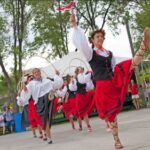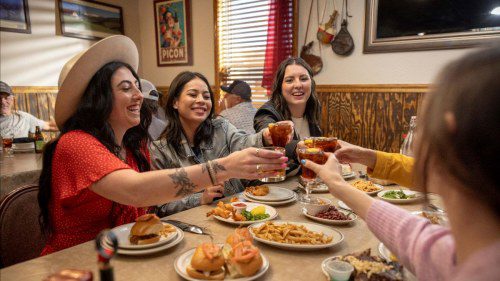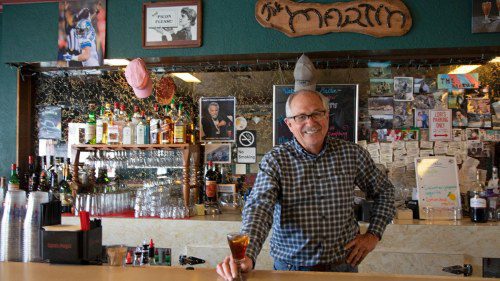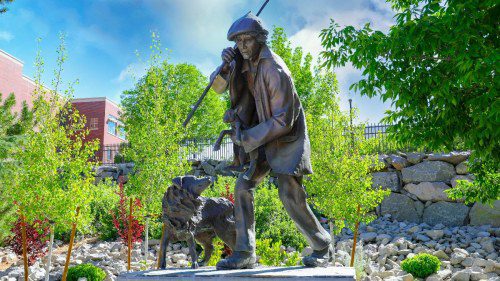 Nevada has a “little-known” European cultural heritage which continues to be celebrated today. To share these stories and experiences with visitors and locals alike, Travel Nevada has created a Basque itinerary, guiding adventurers on a journey of discovery through the northern Nevada region.
Nevada has a “little-known” European cultural heritage which continues to be celebrated today. To share these stories and experiences with visitors and locals alike, Travel Nevada has created a Basque itinerary, guiding adventurers on a journey of discovery through the northern Nevada region.
The Basques, originating from a region on the northern border between Spain and France and known for their hearty, welcoming nature and vibrant culture, first migrated to Nevada in the 19th century for gold. Over time they brought their sheepherding skills to northern Nevada’s rugged mountainous terrain, setting up homes across Gardnerville, Reno, Winnemucca, Elko and Ely.
Over a century later, Nevada’s Basque communities have woven a distinctive thread into the state’s cultural fabric and left a distinct mark on Nevada’s personality, from Basque boarding houses and family-style feasts, to folklore and festivals.
Key highlights of Travel Nevada’s Basque itinerary include:
Feast on authentic Basque tastes
J.T. Basque Bar and Dining Room in Gardnerville was originally founded in 1896 and is regarded as a Nevada icon with its colourful history as a saloon, hotel and dining hall. For the last 60 years it has served an authentic Basque menu and traditional Picon Punch alcoholic cocktail – Nevada’s unofficial state cocktail – created by immigrants from the Basque region in the Pyrenees to the U.S.
The Star Hotel in Elko is rooted in Basque history. The owners may have changed since 1910, but the history, unique recipes and European atmosphere has lived on. Signature dishes include the homemade cabbage soup accompanying a variety of seafood and meat dishes including spicy grilled haddock, mountain trout and filet mignon.

Louis’ Basque Corner in Reno was named a USA TODAY 2024 Restaurant of the Year, and has been a home away from home for Basque immigrants since 1967. Founded by Louis Erreguible, a World War II veteran and emigrant from France’s Pyrenees region, the menu pays homage to the founder’s heritage including paella, sweetbreads, tongue, tripe and oxtail with servers outfitted in authentic Basque costumes.
The Martin Hotel originally opened in 1898 to serve Basque sheepherders working in the northern Nevada mountain ranges surrounding Winnemucca. During Prohibition, the hotel and restaurant downstairs prospered while a speakeasy thrived in what is now the attic. The story is told that when the Revenuers found the whiskey, they dumped it down Melarky street, and people turned out with cups to sample it as it flowed. Today, the dining and live music house serves dishes inspired by this early heritage and boasts a cocktail menu inspired by specialty drinks from the late 1870s to 1930s.
The Fe is housed in a historic Reno building dating back to 1907, serving traditional Basque appetisers called “pintxos.” Choose from bites like chorizo + Manchego, serrano ham + cheese, fig jam + duck, and potato croquetas. The small plates continue with garlic shrimp, lamb lollipops, octopus turadito and more. Between bread, you’ll find classic Basque favourites, including lomo Milanese (starring breaded pork loin), beef tongue, and a chorizo burger.
Sample Pete’s famous Basque chorizo made from a family recipe passed down over the generations, originating from Basque country. Pete’s Famous Chorizo is naturally air dried and made from 100% pork meat, and flavoured with garlic, paprika and other spices. The delicious house-made meat can be ordered from or sampled on the menu at Villa Basque Cafe in Carson City.

Explore Basque heritage at Nevada’s museums and landmarks
Carson Valley Museum and Cultural Centre features an impressive array of local and state history, ranging from Basque and American Indian history and heritage, and early life in Gardnerville, Minden, Genoa and the broader Carson Valley Area. The Basque exhibit offers a glimpse into the lonely life of a Basque sheepherder in the surrounding Pine Nut Mountains, with a tree carving (or arborglyph) telling his story.
Northeastern Nevada Museum offers a variety of displays of early Elko Country life, including exhibits with artefacts that offer a glimpse into the region’s strong Pyrenees influence.
National Monument to the Basque Sheepherder is located at the William A. Douglass Center for Basque Studies at the University of Nevada, Reno. It honours those who emigrated to the American West to herd sheep, work shunned by most Americans due to its isolation, challenges and low pay. The name of the monument “Solitude/Bakardade” reflects the loss of the former homeland, to start a new life in Nevada’s north.
Peruse the Jon Bilbao Basque Library, the leading library on Basque subjects outside of the Basque Country at the University of Nevada, Reno. It aims to be a research library for all researchers interested in Basque Culture and the Basque Diaspora, a memory institution for the Basque Community throughout North America, and a comprehensive portal to access Basque studies in English for researchers and institutions.

Celebrate Basque culture in festival style
The National Basque Festival is celebrated annually each July in Elko. First starting in 1964 as a local gathering for sheepherders and cattle ranchers, today the two-day festival draws thousands of visitors to celebrate Basque food and culture, with dancing, traditional music, woodchopping competitions, mouthwatering paella and lamb, and chances aplenty to taste the unofficial state drink, the Picon Punch.

















